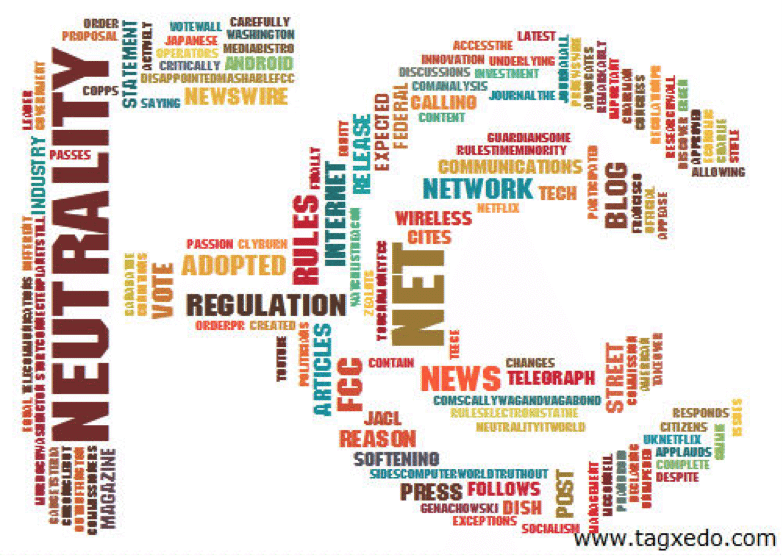This week, the Court of Appeals for the D.C. Circuit upheld the Federal Communications Commission’s (FCC) net neutrality rules. The net neutrality rules in place prevent internet service providers (ISPs) from blocking, disrupting, or diminishing internet traffic that may not be profitable. The rules effectively classify high-speed internet as a public utility, like water or electricity, and a necessity, rather than as a luxury item.
“Net neutrality” requires an ISP to treat all of its traffic equally. This protects consumers by preventing ISPs from granting additional bandwidth or speed to websites that pay the ISP more, in the same way that water companies are not allowed to slow down water flow to poorer service areas. This would effectively slow down any other sites that could not or would not pay that premium. Without this protection in place, if Netflix paid Comcast a sum of money, Comcast could prioritize Netflix’s traffic over Hulu’s, slowing down Hulu’s service and making Hulu annoying or impossible to use. This could have the side effect of driving traffic straight over to Netflix for smooth, glitch-free streaming video.
Unsurprisingly, this is a hotly contested issue, typically with consumers and consumer advocates on one side and telecommunications companies on the other. AT&T has already announced that it will appeal the ruling, and will likely find support from other telecommunications giants like Verizon and Comcast. The issue boils down to economics. Some believe that the current FCC net neutrality rules requiring all ISP’s to treat all internet traffic identically will discourage investment in service providers and interfere with economic growth.
Arguments For and Against Net Neutrality
The arguments against current net neutrality focus on the burdens it can place on the ISPs. “There’s a better way to protect consumers from blocking and throttling without stifling innovation or delaying build-out,” said Rep. John Shimkus (R-Ill.), believing that these regulations will harm the ISPs—and, down the line, harm consumers. Some believe that the equal-access regulations are archaic, like the original telephone regulations, and that they interfere with free speech.
The Chairman of the FCC, Tom Wheeler, applauded the D.C. Court, saying, “Today’s ruling is a victory for consumers and innovators who deserve unfettered access to the entire Web, and it ensures the internet remains a platform for unparalleled innovation, free expression, and economic growth.”
In a world where only a few large ISPs carry the vast majority of the United States’ web traffic and have virtual monopolies on large swathes of the country, the FCC argues that allowing content companies to buy priority access to the internet is unfair. In the example above, in which Comcast pushes out Hulu’s traffic in order to make room for Netflix, this could effectively eliminate Hulu as an option for tens of millions of people who don’t have an alternative ISP to Comcast.
At the same time, an argument from Netflix’s and Comcast’s perspectives is that Netflix can spend its advertising revenue where it sees fit, and enter into a mutually agreeable contract with Comcast to promote its business. Comcast, too, is allowed to do business as it sees fit, accepting that payment or advertising consideration from Netflix and giving Netflix something in return (prioritized bandwidth access). This type of First Amendment argument, that using money to promote a certain type of speech is a valid exercise of freedom of speech, has been argued in campaign finance cases around the country.
This case will likely end up at the Supreme Court, and it will be an interesting battle, with substantial case law supporting both sides.
For more information about internet regulations, contact Revision Legal’s team of experienced internet attorneys through our contact form or by calling 855-473-8474.
Image courtesy of Flickr user Sean Weigold Ferguson




